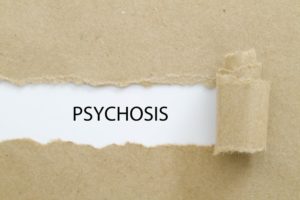Drug abuse and addiction don’t just impact the individual with substance use disorder. Abusing drugs also creates many problems within society and the individual’s community. Thousands of people are in jail for crimes committed in relation to drug abuse and addiction. Unfortunately, some drugs can impact a person’s thinking in dangerously erratic ways that can cause them to become injured or harm others because of their drug use. Drug-induced psychosis is a real risk for people who take certain legal and illegal drugs. The types of drugs most frequently implicated in drug-induced psychosis are amphetamines, methamphetamine, and synthetic marijuana and bath salts.
How is drug-induced psychosis different than psychosis in mental illness?
Psychosis refers to a mental health issue that causes a person to experience increased paranoia, delusions, and hallucinations. People in a psychotic episode experience the world in a remarkably different way than those who are not psychotic. They will believe things that are not true, regardless of any evidence to the contrary. It is almost impossible for a rational person to get through to someone who is experiencing psychosis. When someone is psychotic, they need outside medical intervention. People who experience psychosis as a result of a mental health disorder can be treated in a hospital with medications that are specifically designed to alleviate psychotic symptoms. Psychosis can happen in bipolar disorder, depression, and schizophrenia.
When someone takes too much of a substance than their body can process, the chemicals can reach toxic levels in the person’s brain and other bodily systems. Stimulant abuse is the most common trigger for drug-induced psychosis. Some prescription drugs can induce psychosis, and so can alcohol abuse. These episodes are referred to as drug-induced psychosis.
People who have drug-induced psychosis will experience delusions and hallucinations. A delusion is an irrational, false belief that someone clings to despite any evidence or facts that indicate the misconception is incorrect. When someone has a psychotic episode because of drug or alcohol abuse, they can experience both visual and aural hallucinations. The individual will have powerful, sensory perception of something that is not real, and that others cannot see or hear.
While drugs can induce psychosis in a person who would otherwise never experience these issues, cocaine, hallucinogens, and also marijuana can trigger or worsen psychotic symptoms in a person with a pre-existing mental health disorder. Some physical problems can also induce psychosis, including Alzheimer’s, dementia, and brain tumors.
How does drug-induced psychosis happen?
When someone takes far too much of a drug, their body cannot always process the toxins fast enough. When this happens, distressing symptoms can occur, and it also puts the individual at risk of fatally overdosing on a substance. Synthetic drugs, cannabis, and amphetamines are the most likely to cause psychosis in persons who take too much of the drug. It’s also possible for someone to experience psychosis when they mix different substances, withdrawal from some drugs, or have an adverse reaction to a drug. Common prescription medications that can induce psychosis include the following:

